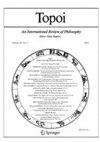Feeling Emotions for Future People
IF 1.3
2区 哲学
0 PHILOSOPHY
引用次数: 0
Abstract
Abstract It is more difficult to feel emotions for future generations than for those who currently exist, and this seems to be one of the reasons why we struggle to care for the future. According to a number of authors, who have recently focused on the psychological flaws that prevent us from dealing with transgenerational issues, the main problem is “future discounting”. Challenging this common view, we argue that the main reason we struggle to care about future generations lies in two features of our daily emotions: the «identified victim effect» and the decrease in empathy for people who are different from us. These traits give rise to two puzzles we call the problem of the indeterminateness of future persons and the problem of dissimilarity . After having analyzed these problems of our moral psychology, we show how they allow us to account for some differences in affectivity towards a number of entities that do not currently exist, such as future generations, past generations and fictional characters. Bearing in mind the real limits of our emotions when dealing with future people, we sketch an alternative proposal on how to develop emotions to provide citizens of liberal democracies with a motivation to act in favor of future generations.为未来的人感受情感
与现在的人相比,我们更难以感受后代的情感,这似乎是我们难以关心未来的原因之一。最近,一些研究阻碍我们处理跨代问题的心理缺陷的作者表示,主要问题是“未来贴现”。挑战这一普遍观点,我们认为,我们努力关心后代的主要原因在于我们日常情绪的两个特征:“确定受害者效应”和对与我们不同的人的同理心的减少。这些特点引起了两个难题,我们称之为未来人的不确定性问题和差异性问题。在分析了我们道德心理的这些问题之后,我们将展示它们如何让我们解释对一些目前不存在的实体的情感差异,比如未来的几代人,过去的几代人和虚构的人物。考虑到我们在与未来的人打交道时情感的真正局限性,我们就如何培养情感,为自由民主国家的公民提供一种为后代服务的动机,提出了另一种建议。
本文章由计算机程序翻译,如有差异,请以英文原文为准。
求助全文
约1分钟内获得全文
求助全文
来源期刊

TOPOI-AN INTERNATIONAL REVIEW OF PHILOSOPHY
PHILOSOPHY-
CiteScore
3.10
自引率
7.10%
发文量
47
期刊介绍:
Topoi''s main assumption is that philosophy is a lively, provocative, delightful activity, which constantly challenges our received views, relentlessly questions our inherited habits, painstakingly elaborates on how things could be different, in other stories, in counterfactual situations, in alternative possible worlds. Whatever its ideology, whether with the intent of uncovering a truer structure of reality or of soothing our anxiety, of exposing myths or of following them through, the outcome of philosophical activity is always the destabilizing, unsettling generation of doubts, of objections, of criticisms. It follows that this activity is intrinsically a ''dialogue'', that philosophy is first and foremost philosophical discussion, that it requires bringing out conflicting points of view, paying careful, sympathetic attention to their structure, and using this dialectic to articulate one''s approach, to make it richer, more thoughtful, more open to variation and play. And it follows that the spirit which one brings to this activity must be one of tolerance, of always suspecting one''s own blindness and consequently looking with unbiased eye in every corner, without fearing to pass a (fallible) judgment on what is there but also without failing to show interest and respect. Topoi''s structure is a direct expression of this view. To maximize discussion, we devote most or all of this issue to a single topic. And, since discussion is only interesting when it is conducted seriously and responsibly, we usually request the collaboration of a guest-editor, an expert who will identify contributors and interact with them in a constructive way. Because we do not feel tied to any definite philosophical theme (or set of them), we choose the topic with absolute freedom, looking for what is blossoming and thriving, occasionally betting on what might - partly through our attention - ''begin'' to blossom and thrive. And because we do not want our structur e to become our own straightjacket, we are open to contributions not fitting the ''topos'', and do not rule out in principle the possibility of topic-less issues.
 求助内容:
求助内容: 应助结果提醒方式:
应助结果提醒方式:


